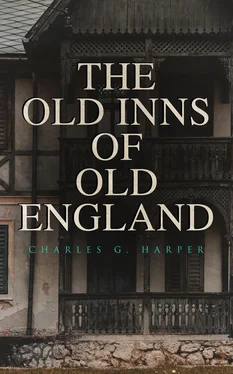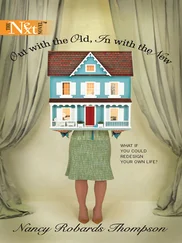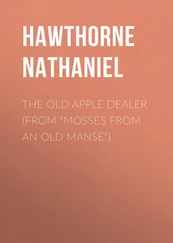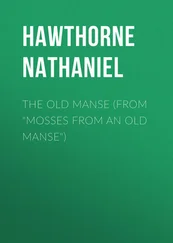1 ...6 7 8 10 11 12 ...18 His arguments in silly circles run,
Still round and round, and end where they begun.
So the poor turnspit, as the wheel runs round,
The more he gains, the more he loses ground.
These unfortunate dogs acquired a preternatural intelligence. A humorous, but probably not true, story is told, illustrating this. It was at Bath, and some of them had accompanied their mistresses to church, where the lesson chanced to be the tenth chapter of Ezekiel, in which there is an amazing deal about self-propelled chariots, and wheels. When the dogs first heard the word “wheel” they started up in alarm; on its occurring a second time they howled dolefully, and at the third instance they all rushed from the church.
Strangely modern appear the grievances raised against innkeepers in the old times. The bills they presented were early pronounced exorbitant, and so, in spite of measures intended for the relief of travellers, they remained. Indeed, throughout the centuries, until the present day, the curious in these matters will find, not unexpectedly, that innkeepers charged according to what they considered their guests would grumble at—and pay.
The eighteenth-century locus classicus in this sort is the account rendered to the Duc de Nivernais, the French Ambassador to England, who in 1762, coming to negotiate a treaty of peace, halted the night, on his way from Dover to London, at the “Red Lion,” Canterbury.
For the night’s lodging for twelve persons, with a frugal supper in which oysters, fowls, boiled mutton, poached eggs and fried whiting figure, the landlord presented an account of over £44. Our soldiers fought the Frenchman; mine host did his humble, non-combatant part, and fleeced him.
This truly magnificent bill has been preserved, not, let us hope, for the emulation of other hotel-keepers, but by way of a “terrible example.” Here it is:
|
|
£ |
|
s. |
|
d. |
| Tea, coffee, and chocolate |
|
1 |
|
4 |
|
0 |
| Supper for self and servants |
|
15 |
|
10 |
|
0 |
| Bread and beer |
|
3 |
|
0 |
|
0 |
| Fruit |
|
2 |
|
15 |
|
0 |
| Wine and punch |
|
10 |
|
8 |
|
8 |
| Wax candles and charcoal |
|
3 |
|
0 |
|
0 |
| Broken glass and china |
|
2 |
|
10 |
|
0 |
| Lodging |
|
1 |
|
7 |
|
0 |
| Tea, coffee, and chocolate |
|
2 |
|
0 |
|
0 |
| Chaise and horses for the next stage |
|
2 |
|
16 |
|
0 |
|
|
44 |
|
10 |
|
8 |
The Duke paid the account without a murmur, only remarking that innkeepers at this rate should soon grow rich; but news of this extraordinary charge was soon spread all over England. It was printed in the newspapers, amid other marvels, disasters and atrocities, and mine host of the “Red Lion,” like Byron in a later age, woke up one morning to find himself famous.
The country gentlemen, scandalised at his rapacity, boycotted his inn, and his brother innkeepers of Canterbury disowned him. The unfortunate man wrote to the St. James’s Chronicle , endeavouring to justify himself, and complaining bitterly of the harm that had been wrought his business by the continual billeting of soldiers upon him. But it was in vain he protested; his trade fell off, and he was ruined in six months.
Sometimes, too, there was a difference of opinion as to whether a bill had or had not actually been paid, as we see by the following indignant letter:
Normanton near Stamford.
2 dSept r1755.
Madam,
My Lord Morton Received a Letter from you of the 5 thAug tinclosing a Bill drawn by you on his Lp for £6 1 11, and to make up this sum p ryour Account annexed to the above-mentioned Letter, you charge twelve shillings for his Servant’s eating, for which he is ready to Swear he paid you in full; then you charge for the Horses Hay for 35 Nights notwithstanding you was ordered to send the horse out to grass, and by the by when the horse came to London he was so poor as if he had been quite neglected which seems probable as he mended soon after he came here; at any rate you have used my Lord ill in the whole affair, and if you or your Servants have committed any accidental mistake either in the Lads Board or the horses hay pray see to rectify it soon, because things of that sort not cleard up and satisfied are very hurtfull to People in your publick way especially with those to whom you have already been obliged, and who at any rate will not be imposed upon. I am—
Madam—
Your humble sert
John Milne.
To M rsBeaver at the Black Bull Newcastle upon Tine, free Morton.
Then there was Dover, notorious for high prices. “Thy cliffs, dear Dover! harbour and hotel,” sang Byron, who bitterly remembered the “long, long bills, whence nothing is deducted.” The “Ship,” the hotel probably indicted by the poet, has long since disappeared, but that gigantic caravanserai, the “Lord Warden Hotel,” could at one time, in its monumental charges, have afforded him material for another stanza. Magnificent as were the charges made by overreaching hosts elsewhere, they all paled their ineffectual sums-total before the sublime heights of the account rendered to Louis Napoleon when Prince-President of France. He merely remarked that it was truly princely, and paid.
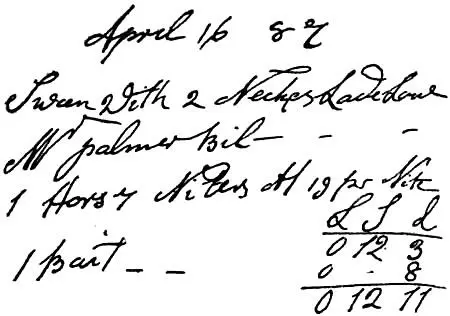
FACSIMILE OF AN ACCOUNT RENDERED TO JOHN PALMER IN 1787.
If, on the other hand, that famous coaching hostelry, the “Swan with Two Necks,” in Lad Lane, in the City of London, charged guests for their accommodation as moderately as the accompanying bill for stabling a horse, the establishment should have been popular. This bill, printed here in facsimile from the original, was presented, April 16th, 1787, to John Palmer, the famous Post Office reformer, and shows that only one shilling and ninepence a night was charged. Yet he was at that time a famous man. Three years before he had established the first mail-coach, and was everywhere well known, and doubtless, in general, fair prey to renderers of bills.
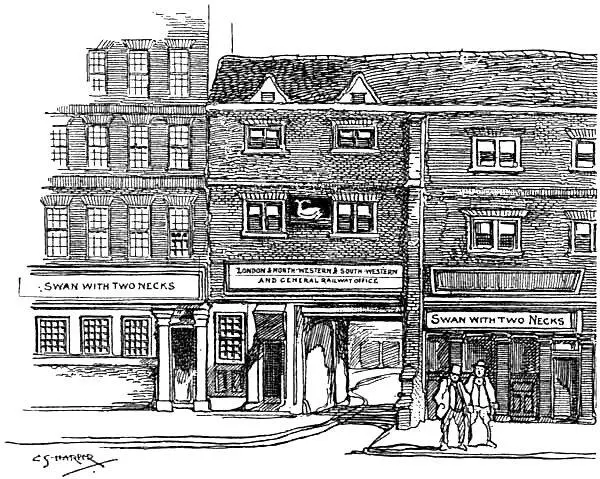
THE LAST DAYS OF THE “SWAN WITH TWO NECKS.”
The “Swan with Two Necks,” whence many coaches set out, until the end of such things, was often known by waggish people as the “Wonderful Bird,” and obtained its name from a perversion of the “Swan with Two Nicks”: swans that swam the upper Thames and were the property of the Vintners’ Company being marked on their bills with two nicks, for identification. Lad Lane is now “Gresham Street,” but, apart from its mere name, is a lane still; but the old buildings of the “Swan with Two Necks” were pulled down in 1856.
Table of Contents
LATTER DAYS
A host of writers have written in praise—and rightly in praise—of that fine flower of many centuries of innkeeping evolution, the Coaching Inn of the early and mid-nineteenth century. Hazlitt, Washington Irving, De Quincey, are all among the prophets; De Quincey, ceasing for the while his mystical apocalyptic style, mournfully lamenting the beginnings of the end that came even so long ago as his day, which, after all, ended not so very long ago, for although he seems so ancient, he died only in 1859. He writes, in early railway times, of “those days,” the days in question being that fine period in coaching and innkeeping, the ’20’s of the nineteenth century.
Читать дальше
